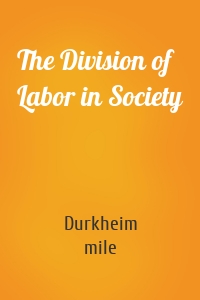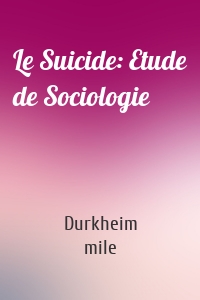Durkheim Émile
10 кн.
The Division of Labor in Society
Émile Durkheim is often referred to as the father of sociology. Along with Karl Marx and Max Weber he was a principal architect of modern social science and whose contribution helped established it as an academic discipline. “The Division of Labor in Society”, published in 1893, was his first major contribution to the field and arguably one his most important. In this work Durkheim discusses the construction of social order in modern societies, which he argues arises out of two essential forms...
| Автор | Durkheim Émile |
The Division of Labor in Society
Émile Durkheim is often referred to as the father of sociology. Along with Karl Marx and Max Weber he was a principal architect of modern social science and whose contribution helped established it as an academic discipline. «The Division of Labor in Society», published in 1893, was his first major contribution to the field and arguably one his most important. In this work Durkheim discusses the construction of social order in modern societies, which he argues arises out of two essential forms...
| Автор | Durkheim Émile |
The Elementary Forms of Religious L...
The French Sociologist Émile Durkheim is commonly cited as the father of sociology. Principle to the work of Durkheim was his concern with regard to how modernity was effecting traditional social and religious institutions, more specifically with how societies could maintain their integrity and coherence in an era in which new social institutions were coming into being. One of his principles works, “The Elementary Forms of Religious Life” is a comparative theory of the religious lives of ancient...
| Автор | Durkheim Émile |
The Elementary Forms of Religious L...
The French Sociologist Émile Durkheim is commonly cited as the principal architect of modern social science and father of sociology. Principle to the work of Durkheim was his concern with regard to how modernity was effecting traditional social and religious institutions, more specifically with how societies could maintain their integrity and coherence in an era in which new social institutions have come into being. One of his principles works, «The Elementary Forms of Religious Life» is a...
| Автор | Durkheim Émile |
The Elementary Forms of the Religio...
"The Elementary Forms of the Religious Life" by Émile Durkheim (translated by Joseph Ward Swain). Published by Good Press. Good Press publishes a wide range of titles that encompasses every genre. From well-known classics & literary fiction and non-fiction to forgotten−or yet undiscovered gems−of world literature, we issue the books that need to be read. Each Good Press edition has been meticulously edited and formatted to boost readability for all e-readers and devices. Our goal is to...
| Автор | Durkheim Émile |
The Elementary Forms of the Religio...
In this 1912 classic, a founder of modern sociology seeks the enduring source of human social identity. Émile Durkheim presents a remarkably accessible examination of animism, naturism, totemism, myth, and ritual. His intriguing views and ultimate conclusion—that the source of religion and morality lies in collective consciousness, rather than in individual minds—remains a topic of debate among sociologists, anthropologists, ethnographers, philosophers, and...
| Автор | Durkheim Émile, Emile Durkheim |
The Elementary Forms of the Religio...
This eBook has been formatted to the highest digital standards and adjusted for readability on all devices. The Elementary Forms of Religious Life analyses religion as a social phenomenon. Durkheim attributes the development of religion to the emotional security attained through communal living. His study of totemic societies in Australia led to a conclusion that the animal or plant that each clan worshipped as a sacred power was in fact that society itself. According to Durkheim, early humans...
| Автор | Durkheim Émile |
Le Suicide: Etude de Sociologie
"Le Suicide: Etude de Sociologie", de Émile Durkheim. Publié par Good Press. Good Press publie un large éventail d'ouvrages, où sont inclus tous les genres littéraires. Les choix éditoriaux des éditions Good Press ne se limitent pas aux grands classiques, à la fiction et à la non-fiction littéraire. Ils englobent également les trésors, oubliés ou à découvrir, de la littérature mondiale. Nous publions les livres qu'il faut avoir lu. Chaque ouvrage publié par Good Press a été édité...
| Автор | Durkheim Émile |











